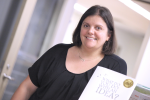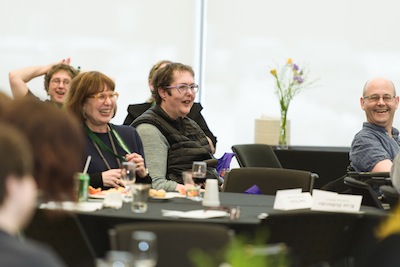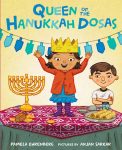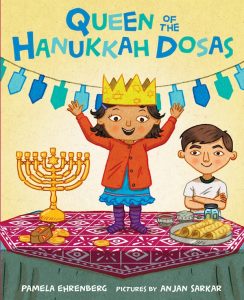Richmond Jewish Day School principal Ronit Amihude with the award-winning children’s book What Do You Do With An Idea? by writer Kobi Yamada and illustrator Mae Besom. (photo by Coleen Lou)
Ronit Amihude is a leader with a vision. The new principal at Richmond Jewish Day School (RJDS) has been working in Jewish education since high school and in day school settings for more than two decades. She brings with her a passion for relevant, pluralistic Jewish education, and training in forward-looking pedagogical theory and practice.
Amihude was born in Winnipeg and moved to Toronto in the early 1990s to work at the Heschel School, at the time a small progressive Jewish school with a dream of crafting creative education that involved children in a way that was individualized and relational. Amihude did a little bit of everything in her 18 years there and was able, she told the Jewish Independent, “to see how you can take a small beautiful seed and turn it into a gorgeous garden.”
Amihude got a master’s in education while at Heschel and went through the Jewish Theological Seminary’s Day School Leadership Training Institute, a 15-month program which, according to their website, “prepares new and aspiring heads of school for their work in Jewish day schools by providing engaging experiential learning opportunities, cutting-edge leadership development, ongoing mentoring, and the chance to collaboratively problem-solve with cohort peers.”
While at Heschel, Amihude took on multiple leadership roles. After her tenure there, she was recruited to Atlanta, where she became the principal of learning, teaching and innovation at the Epstein School.
Richmond Jewish Day School began looking for a new principal after Abba Brodt, a beloved educator and administrator who had been with the school since 2010, left in 2017. Amihude had heard about RJDS over the years and felt it had “the same heimish [homey] feeling as Heschel” and was “a beautiful little school community” that believes all Jewish kids deserve a Jewish education and could be helped to get one.
“The feeling I got was that RJDS is a wonderful place where kids are supported and appreciated, where it is not just STEM that is taught, but kindness, perseverance and acceptance,” she said.
Amihude applied for the job last December and, after multiple Skype calls and phone chats, she flew out in February of this year and contracts were signed around Pesach.
When Amihude spoke with the Independent, it was her fifth day on the job and she generously made time in her hectic schedule to talk. Her first impressions of life at RJDS were resoundingly positive.
“It is a really diverse population where that is celebrated,” she said. “It’s a place where children of all levels of observance and non-observance from all over the world – Israel, Russia, Colombia and elsewhere – learn together. Kids who think everybody eats matzah balls on Yom Tov learn there are lots of ways to be Jewish.”
Amihude said a balance between tradition and pluralism is important for her, and the school community is open to different styles of being Jewish. This approach is showcased, in part, by their pluralistic approach to tefillah (prayer), which embraces Orthodox and progressive rituals. “If kids are given a hard line, telling them that only one way is authentic,” said Amihude, “then what message does that give them if that’s not the way of themselves or their family – that they’re not Jewish?”
This fall at RJDS, students took part in the international Kindness Rocks movement, where kids decorate rocks with messages of encouragement and kindness and place them out in the community. The school put a unique spin on this practice by integrating it into the days of teshuvah (repentance/return) between Rosh Hashanah and Yom Kippur.
Amihude said an essential part of her mission at RJDS is giving kids the tools to find their own Jewish selves outside of school and to help their families figure out who they are and what they want to be doing. She wants to see a collaborative space where kids can work together to create, to learn perseverance and problem solve.
“Can the kids build a model sukkah? Can they create a double-decker chanukiyah for parents and kids to light together? There is so much we can be doing with 21st-century skills, while celebrating the Jews that we are and the people that we want to be.”
Matthew Gindin is a freelance journalist, writer and lecturer. He is Pacific correspondent for the CJN, writes regularly for the Forward, Tricycle and the Wisdom Daily, and has been published in Sojourners, Religion Dispatches and elsewhere. He can be found on Medium and Twitter.





